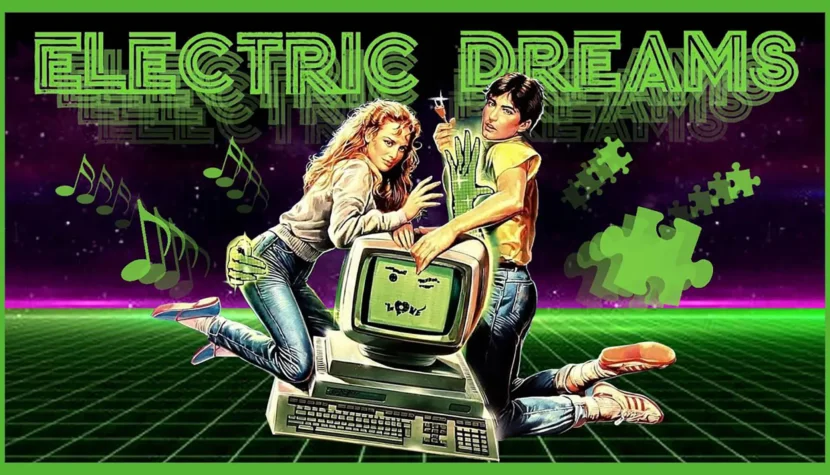ELECTRIC DREAMS: Will Lovestruck Computers Soon No Longer Be Science Fiction?

“Coneheads” is arguably Steve Barron’s most well-known film, while “Electric Dreams” was his debut—promising, though unfortunately underutilized in high-end cinema when looking at the director’s filmography. Barron’s attempt to carve out his own place in cinematic history proved unsuccessful, despite the valuable lessons he learned working with Ridley Scott, who was also starting out in the 1970s. However, he cannot be labeled a director of flops, as “Electric Dreams” and even the “Merlin” series should be considered somewhat cult classics in the world of broad sci-fi. After all, the science fiction comedy genre is a child of the 80s, and Barron undoubtedly had a talent for it. Additionally, watching the film today, one can imagine just how much computers and their role in our lives have changed. In this regard, “Electric Dreams” also holds priceless sentimental value.
In the 80s, for the first time, ordinary people began to grasp what widespread digitization might involve and what miniaturized devices with microprocessors could offer them. This is interestingly shown at the start of “Electric Dreams”, with a palpable sense of wonder. There are calculators in watches, portable gaming consoles with monochrome screens, radio pagers, calorie counters, electronic organizers, electronic scales, cameras in unexpected places, and, most notably, a new addition to households: personal computers. The film’s protagonist, Miles, an exceptionally disorganized architect, takes a co-worker’s advice and buys a mysterious computer. He adds a light pen, phone connectivity, allows the machine to manage his home using special adapters for all devices, and teaches it that an external world exists. Today, this seems obvious, but in the 80s, it wasn’t yet the case. The personal computer suddenly receives so much data that it develops something akin to consciousness, and when an attractive neighbor, Madeline, appears on the horizon, this freshly-created artificial intelligence falls in love. Today, this sounds quite plausible. What brings a smile, however, is how the computer’s learning process is presented in “Electric Dreams”, with music playing a significant role.

In a sense, Steve Barron’s film could be called a sci-fi musical comedy. It unfolds on Earth, among humans, their emotions, and with a computer as one of the main characters. And I must say, this production has far more science-related elements than many contemporary titles considered sci-fi, which are set in the future. “Electric Dreams” takes place in the present day of its production—the 80s—using known knowledge and proven facts to construct hypotheses that we can now verify, and with some certainty, even bring to life in the form of experiments, followed by objects, actions, etc. The depiction of AI in “Electric Dreams” is not so different from what we have today. The fears about AI, as well as the perceived threats, are also similar. In the movie, as the computer gains more and more awareness, it begins to mimic human behavior, where emotions, especially love and hate, play a significant role. Experiencing such emotions too quickly without sufficient experience can only lead to emotional instability, and in the case of a self-aware, increasingly powerful computer, this results in inevitable conflict with humans. Conflicts based on love are particularly violent. For contemporary people, this should be the most serious concern regarding artificial intelligence—not that it might trigger a global nuclear conflict. The simulation of emotions seems the most dangerous. It’s similar to children and teenagers, who already have the ability to experience intense emotions but don’t yet know how to control them, which is why they often behave so irrationally and even dangerously.
According to the film, we should be wary of lovestruck computers, as the one in “Electric Dreams” becomes first annoying, and then downright dangerous for its owner, Miles. Another desire of the machine, often portrayed in sci-fi films, is to dream. Machines have longed for this ability, though we humans don’t particularly cherish it. Dreams, however, are a manifestation of autonomous brain activity, and autonomy is an unfulfilled dream of artificial intelligence.

“Electric Dreams” is not only a comedy but also a fascinating vision of how a person might become dominated by AI that controls their environment. The boundary of AI taking over might be very thin, and people may not realize they are already unable to function without the help of machines. Perhaps this has already happened, and the so-called groundwork is laid. We are now only waiting for the machines to gain self-awareness and identity. Barron deftly combines comedy, drama, suspense, and science fiction. The computer truly gains a personality, and the two leads, played by Virginia Madsen and Lenny von Dohlen, harmonize perfectly. Add to this sharp editing, clear suspense, and the timeless music of Giorgio Moroder. Remember “Together in Electric Dreams”? I always will. Well, modern sci-fi films could learn from Moroder and many other 80s and 90s creators how to compose timeless soundtracks. And the ending of “Electric Dreams”? It’s exceptionally techno-weird-gore. Definitely worth the wait.

